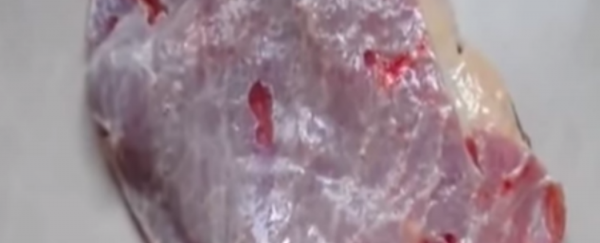
On the morning of June 25, Ms Cheng Jining Surabaya bought a slab of beef from a butcher in the eastern Chinese province of Shandong, and took it home. An hour later, she says, she lay the meat out on the counter and was about to slice it, when she noticed that it was twitching and pulsing vigourously, as if it had its very own heartbeat. She claims she captured the phenomenon on her phone, which you can see above.
"It looks like it is still alive, or that there are worms or something inside," Ms Cheng told reporters the following day. "However, when I cut it open I didn't find any worms, just twitching."
The validity of the claim and the footage has been brought into question, but after an examination of the meat, Lv Suwen from the Lixia District of Jinan City Animal Health Authority said it was perfectly safe to eat. The explanation given by Lv is that the cow was recently slaughtered and butchered, and the nerve endings in this particular region of the animal had not yet died.
"You can rest assured, this piece of meat is very fresh and is from a freshly slaughtered animal. The central nervous system is dead, but the nerve endings in the muscles are still firing, resulting in the jumping. This will stop after a short time," Lv told the press, adding that tampering was unlikely, having never seen a case of drugs or hormones being used to illicit such a response in raw meat.
The problem with this explanation, Australian butcher Chris Martin from Lucas Meats in Sydney told 9News, is that these nerve endings couldn't possibly have still be firing for more than 90 seconds after the animal was slaughtered, let alone 60 minutes. "When an animal is killed there will often be involuntary spasms," he said, but added that the window of time for this to occur is extremely brief.
Meanwhile, how'd you like to see a turtle's heart beating outside its body, several hours after the animal had been killed? In the video below, YouTuber reggiefavre explains that she killed a turtle for a meal, and even after completely extracting the heart, it continued to beat for hours. Back in 1957, researchers reported in The American Biology Teacher that an alligator snapping turtle had been killed and decapitated in the States, and its heart continued beating for an incredible five days.
The reason the heart can beat after death - in humans, the brain can stop functioning but the heart will keep beating, for up to an hour if outside the body - is that the beating of the heart is regulated not by the brain, but by nerve cells and chemicals contained in the organ itself.
"The heart itself is a two part pump: one part electrical, the other is plumbing. The electrical part is mediated by electrolytes like sodium, potassium and calcium. The electricity created is what 'shocks' the heart and causes it to contract and squeeze blood out to the body."

I don't want to do it, but I have to, so… Indiana Jones, eat your heart out. (I'm sorry.)
